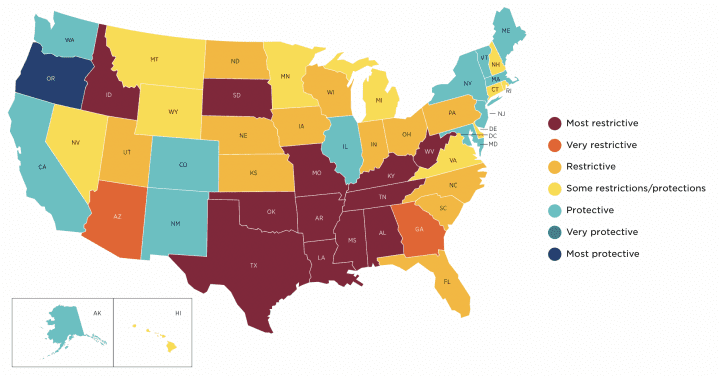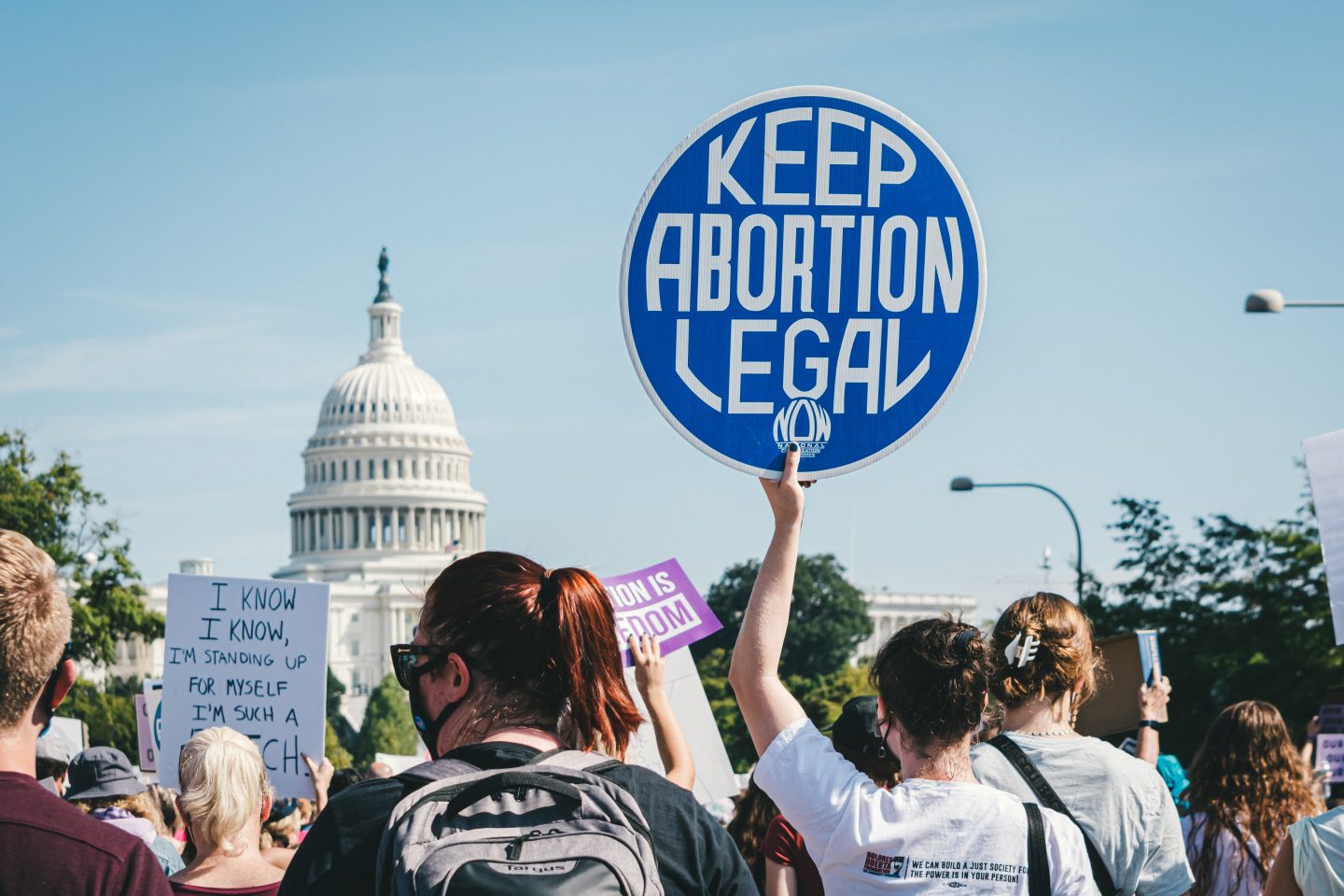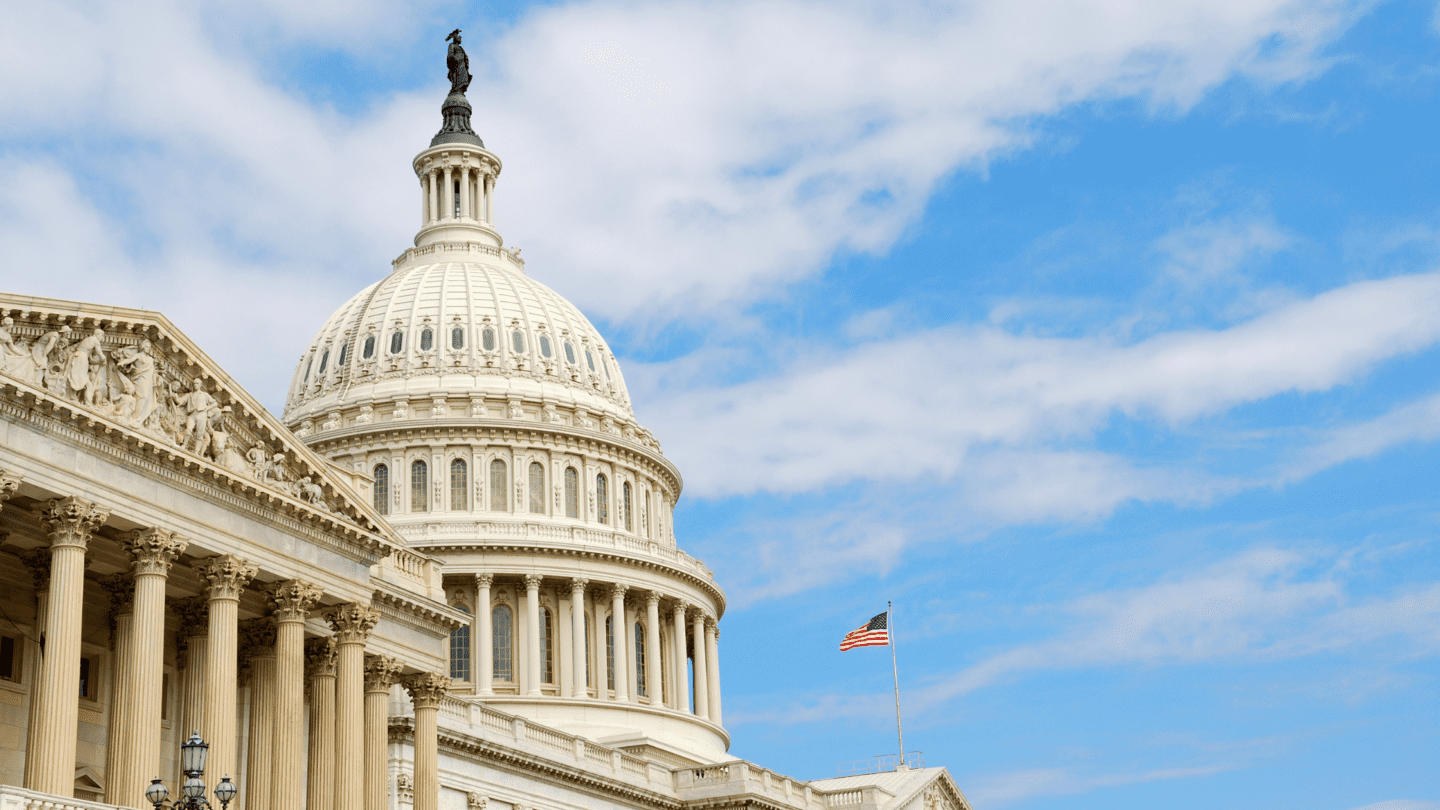The State of Abortion Laws in a Post-Roe United States: Four months later
Published October 21, 2022
Nearly four months since the U.S. Supreme Court decision1 that dismantled a federally protected right to abortion, the state of abortion access around the country is a volatile minefield: a jumble of trigger bans, antiquated laws brought back from the dead, legal battles, enforcement challenges, and people with unwanted pregnancies trying to make sense of it all.
Thirteen states have laws currently in effect that ban nearly all abortions,2 while five other states have abortion bans in effect with gestational limits of between 6 and 20 weeks. Eight more states have abortion bans on the books that have been either temporarily or permanently blocked through legal challenges. Meanwhile, some federal lawmakers have doubled down on efforts to pass legislation that would protect abortion rights: the U.S. House of Representatives passed the Women’s Health Protection Act3 in July, though the bill is unlikely to pass in the Senate, needing the support of at least 10 Republican Senators.
As midterm elections quickly approach, this fall is a critical moment for taking action around . We’ve rounded up some key facts on the current context of abortion access – and the dire situation in states where it has been outlawed – so that you can be equipped with the information you need to make informed choices at the ballot box, and to educate your peers about what is stake for the reproductive health care of millions of Americans.
Is adyn right for you? Take the quiz.
Pre-Roe statutes and legal challenges
Immediately following Dobbs v. Jackson Women’s Health Organization, the June decision that overturned Roe v. Wade, efforts began to resuscitate old abortion bans that predated the landmark 1973 ruling. Texas Attorney General Ken Paxton rapidly sent out an advisory4 following the Supreme Court decision, declaring that a Texas pre-Civil War era abortion ban5 was “still Texas law.” Meanwhile in Arizona, conservative lawmakers argued that an abortion ban from 1864 – before Arizona was a state – should be enforced. For Arizonans, the question of whether the pre-Roe ban is the current law of the land has been confusing, to say the least: in September an Arizona judge ruled that the law can take effect,6 halting nearly all abortions in the state, but then in October an appeals judge ruled that enforcement of the law be paused7 during the appeals process. The ruling halting the Arizona law is temporary, and some lawmakers have called for a special legislative session to repeal the law.8
Judges have blocked enforcement of pre-Roe abortion bans in Michigan, West Virginia, and legal efforts to halt pre-Roe bans are underway in Wisconsin. Other states with pre-Roe abortion bans, such as Alabama, Arkansas, Mississippi, Oklahoma, had additional trigger bans or newer abortion bans set to go into effect that rendered the older laws moot. But even in states where pre-Roe abortion bans are not being enforced because of legal challenges, fear of criminal or civil penalties and prosecution by abortion providers is still taking a significant toll on access.9 Some abortion clinics in states where abortion is still legal, like Michigan,10 West Virginia,11 and Wisconsin12 have intermittently stopped or paused abortion services due to the anxiety and confusion of the legal roller coaster.
Trigger laws
Prior to the Dobbs decision, 13 states had trigger bans13 in place – laws designed to outlaw abortion in the case that Roe v. Wade was overturned. Although some trigger laws took effect in June immediately following the ruling, others had lagging effective dates, and some, such as the trigger law in Wyoming,14 have been stalled because of legal challenges.
The specifics of trigger laws vary by state, with many outlawing abortions even in cases of rape and incest. While most criminal and civil penalties are directed toward abortion providers, some states have pursued criminal charges against women who have self-induced abortions or assisted in inducing, including Texas15 and Nebraska.16
Although all of the abortion bans in place have narrow exceptions for cases of medical emergency, many physicians and abortion rights advocates have argued that these exceptions are inadequate and vague,17 largely leaving decisions of what constitutes a medical emergency up to the discretion of individual doctors. Texas Attorney General Ken Paxton won a lawsuit against the Biden administration18 in August over federal guidance for medical professionals that would have slightly broadened the state’s medical exceptions for abortion; the state currently only allows abortions to save the pregnant person’s life, or to stop “substantial impairment of major bodily function.”
Some states’ abortion bans have also impacted contraceptive access. Idaho’s restrictive law resulted in new guidance from the University of Idaho forbidding faculty and staff from offering or talking about abortion.19 Politicized rhetoric around emergency contraception, such as Plan B, has worsened confusion, with leaders conflating with abortion20 and at least 12 states permitting some health care providers to deny contraceptive services to patients.21 Pharmacists at Walgreens and CVS in states with abortion bans have also begun denying medications to patients that could induce abortion,22 even if the patient isn’t pregnant. These have included prescribed treatments for rheumatoid arthritis, osteoporosis, and stomach ulcers, USA Today recently reported.
Enforcement challenges
For states with abortion bans in effect, whether that law will actually be enforced largely depends on local and county district attorneys. Following the Dobbs ruling, prosecutors in 29 states23 pledged not to enforce laws criminalizing abortion providers or people seeking abortion care. In states with pending legal challenges, the role of county and district attorneys has become more central to questions of abortion. In Arizona, where the abortion ban is currently being challenged, Maricopa County Attorney Rachel Mitchell announced recently24 that she will not pursue criminal charges against people seeking abortions. Maricopa is the state’s most populous county by far, containing more than half of Arizona’s population.25
Meanwhile, some city governments within states that ban abortion – including Cincinnati, OH; Austin, TX; Durham, NC; and Tucson, AZ – have sought to decriminalize abortion or ordered local police departments not to pursue arrests for abortion-related charges.
Other lawsuits
Federal and state courts are also hearing a range of other cases related to abortion access and the right to an abortion. The Satanic Temple has filed lawsuits against Idaho and Indiana, arguing that the states’ abortion bans violate church members’ right to religious freedom26 because bodily autonomy is a core tenet of the group’s beliefs. A Jewish synagogue in Florida has also filed suit against the state on religious grounds, and three Jewish women have filed suit against Kentucky,27 all arguing that Judaism holds that there be a right to abortion.28 In Texas, a coalition of abortion funds have sued the state over the right to fund pregnant people who seek abortions in other states.29
The legal limits of abortion by mail
Medication abortion constitutes more than half of all abortions in the U.S., according to the Guttmacher Institute30 and the legality of abortion by mail has emerged as a key battleground for the future of abortion access. Although 19 states have banned telehealth prescriptions of abortion medication,31 the U.S. Postal Service will not interfere with the mailing of abortion medications,32 and the Food and Drug Administration allows interstate shipment of abortion medication by mail,33 leaving enforcement of individual state bans largely up to the providers mailing the pills.34 The website Plan C offers instructions for how pregnant people in states with abortion bans can access abortion pills by mail, while the international telehealth abortion provider Aid Access announced that it would continue sending abortion medication by mail to all states, even those with bans in effect.35
State by state abortion access continues to shift dramatically, and the midterm elections will likely play a major role in shaping the future of reproductive health care access in the United States as democratic lawmakers advance legislation aimed toward protecting abortion access, while some conservative lawmakers seek to further limit it. For information about current abortion access in your state, visit the Guttmacher Institute’s interactive map, which is updated regularly with information about abortion policies and access in each state.
Like what you’re reading? Get the latest straight to your inbox 💌
The State of Abortion Laws in a Post-Roe United States: June 2022
Published June 24, 2022
For people seeking abortions, geography matters. United States laws that shape access to abortion vary widely depending on where you’re located. While some states have passed laws enshrining the right to an abortion regardless of Supreme Court rulings, others have extensive measures in place designed to halt all abortions now that Roe v. Wade has been overturned.
The 6-3 Supreme Court decision announced Friday upended nearly fifty years of precedent, since the landmark 1973 Roe v. Wade decision established a constitutional right to an abortion. The majority opinion, penned by Justice Samuel Alito, argues that abortion access should be decided by the states; and now that Roe has been overturned, 26 states are either certain or likely to ban abortion, according to the Guttmacher Institute. Other Supreme Court decisions in recent months had suggested Roe would fall, and many conservative state legislatures have been preparing and advancing legislation with that in mind.
More than a dozen states have advanced copycat laws that eviscerate access to abortion after the U.S. Supreme Court decided to not stop a Texas abortion ban in fall 2021. Thirteen states have passed “trigger laws” that ban abortion upon the overturning of Roe v. Wade, while seven more states have existing abortion bans on the books that will go back into effect. Amid increased demand for abortion medication by mail, state legislation has also emerged restricting it. Meanwhile, sixteen states and the District of Columbia have passed laws that protect and uphold the right to abortion, regardless of federal law.
Here, we break down what you need to know about the different state laws shaping abortion access throughout the country.
The inventive fallacy of “heartbeat bills”
Many states have proposed what are termed “heartbeat bills,” banning abortion as early as six weeks into pregnancy after detection of what their proponents say is a “fetal heartbeat.” Medical experts have disputed this framing as “clinically inaccurate”, because embryos do not yet have a heart at six weeks, nor are they considered a fetus at that stage in gestation. An inventive Texas law passed in May 2021, Senate Bill 8, was the first of such laws to be enforced – it possesses an unusual enforcement mechanism where any person can bring a civil suit against someone who ‘aids and abets’ the provision of an abortion, and can collect a $10,000 bounty. This facet of the bill has made judicial challenges more difficult, and in September 2021 the Supreme Court ruled 5-4 to leave the measure in place – a decision some abortion advocates said portended the downfall of Roe v. Wade.
The impacts of the law have been sweeping and profound. Neighboring states experienced an 800% increase in abortion patients from Texas in the first six months after SB8 went into effect, according to data compiled by Planned Parenthood. Requests for abortion medication by mail spiked dramatically, and researchers predict that total abortion bans, now permitted in the wake of Roe v. Wade being overturned, will increase pregnancy-related deaths by 21%, with the greatest impact on non-Hispanic Black people where deaths are expected to rise 33%.
A wave of copycat legislation has followed in other states, with conservative lawmakers emboldened by the Supreme Court’s failure to halt SB8. In recent months, lawmakers have passed abortion bans in Arizona, Oklahoma, and Florida, while other states have introduced similar legislation that has not yet passed.
Trigger laws
Thirteen states have passed what are known as “trigger laws” – measures designed to immediately ban abortion following the overturning of Roe v. Wade. In seven states, abortion bans that predate Roe v. Wade are still on the books, and would become enforceable again following it being overturned. In total, 26 states are expected to rapidly ban abortion if Roe is overturned, according to the Guttmacher Institute.

Map from Guttmacher Institute. Updated October 21, 2022.
The specifics of state trigger laws vary. Some offer exceptions for rape and incest (Idaho, North Dakota, Utah, and Wyoming), and others do not (Arkansas, Kentucky, Louisiana, Missouri, Oklahoma, South Dakota, Tennessee, and Texas). Some states would make performing an abortion a felony offense for doctors, with fines as high as $100,000 and prison sentences ranging from two to 20 years.
Abortion medication by mail
Medication abortions account for more than half of all abortions performed in the United States, according to the Guttmacher Institute. But as more states have passed abortion restrictions and bans, the accessibility of abortion medication by mail has become a key battleground. A December decision by the Food and Drug Administration established a federal standard permitting abortion by mail, permanently lifting in-person requirements for obtaining abortion-inducing medications, while varying state restrictions on abortion medication constrain access depending on where you’re located.
Thirty-two states require abortion medication to be provided by a physician according to the Kaiser Family Foundation, while 18 states and the District of Columbia permit abortion medication to be provided by nurse practitioners, physician assistants and nurse-midwives. Eighteen states require heightened standards for clinics that provide abortion care, effectively limiting the number of such clinics that can operate. Six states – Arizona, Arkansas, Missouri, Louisiana, Texas, and West Virginia – have passed laws banning the use of telehealth for dispensing abortion medication.
Abortion protection laws
Despite the wave of laws restricting and banning abortions, many lawmakers are working to improve access to abortion and mitigate the harms caused by abortion bans in other states. Sixteen states and the District of Columbia have laws in place that protect the right to an abortion, with some amending their state constitutions to enshrine abortion access. “The right to reproductive liberty is central to the exercise of personal autonomy,” read an amendment to the Vermont state constitution that was passed in February. The California legislature introduced a proposed amendment along similar lines to be decided by voters in November 2022. “This measure will ensure … an inviolable right to a safe and legal abortion that is protected in our constitution,” said California Governor Gavin Newsom in a June 8 statement.
States have also introduced measures to address the affordability of abortion in order to improve access. Maryland passed the Abortion Care Access Act in 2022, requiring that insurance providers cover abortion costs without cost-sharing, and California passed a similar law. Illinois, New York, and Oregon have similar laws already on the books for coverage of abortion care by state health plans. Connecticut recently passed a law protecting all people within the state –including visitors from other states –from prosecution related to providing or receiving abortion care.
At adyn, we believe all people should have access to safe and humane reproductive healthcare, and will update this piece to reflect changes to abortion access throughout the country in the weeks and months to come.
Resources
- Guttmacher Institute Abortion Policy in the Absence of Roe
- Guttmacher Institute Targeted Regulation of Abortion Providers
- Guttmacher Institute Medication Abortion Now Accounts for More Than Half of All US Abortions
- ACOG Abortion Language Guide
- The 19th Abortion Access Guide
- Kaiser Family Foundation State Actions to Protect and Expand Access to Abortion Services
- Kaiser Family Foundation FACT SHEET: The Availability and Use of Medication Abortion
- Planned Parenthood New Planned Parenthood Data Highlight the Far-Reaching Impact of Texas Abortion Ban
Are you registered to vote? 🗳
Check your voter registration status with our partner Vot-ER.
-
- https://www.supremecourt.gov/opinions/21pdf/19-1392_6j37.pdf
- https://www.nytimes.com/interactive/2022/us/abortion-laws-roe-v-wade.html
- https://www.usatoday.com/story/news/politics/2021/09/24/house-passes-legislation-codifying-right-abortion-federal-law/5842702001/
- https://www.texasattorneygeneral.gov/sites/default/files/images/executive-management/Post-Roe%20Advisory%20(updated%20draft%2006.21.2022)%20(1).pdf
- https://www.texastribune.org/2022/08/17/texas-abortion-law-history/
- https://www.politico.com/news/2022/09/23/arizona-abortion-ban-roe-00058705
- https://www.azmirror.com/2022/10/07/court-puts-arizona-territorial-era-abortion-ban-on-hold/
- https://www.azmirror.com/2022/09/29/strange-bedfellows-brnovich-and-dems-both-want-ducey-to-call-a-special-session-to-resolve-abortion-law-confusion/
- https://19thnews.org/2022/07/abortion-bans-before-roe-confusion-restricted-access/
- https://www.npr.org/2022/08/05/1115666725/confusion-roiled-michigan-for-days-as-abortion-rights-changed-hour-to-hour
- https://www.pbs.org/newshour/politics/after-judges-order-west-virginias-only-abortion-clinic-resuming-care
- https://www.cbsnews.com/chicago/news/wisconsin-doctors-halt-abortions-after-roe-v-wade-overturned-amid-questions-about-a-173-year-old-state-ban/
- https://www.nbcnews.com/politics/politics-news/roe-v-wade-overturned-things-stand-trigger-laws-pre-roe-bans-rcna35282
- https://apnews.com/article/abortion-health-jackson-wyoming-constitutions-042d610059f51c11563b0df3e78a8dc6
- https://www.nbcnews.com/news/us-news/woman-faces-texas-murder-charge-self-induced-abortion-rcna23739
- https://www.npr.org/2022/08/12/1117092169/nebraska-cops-used-facebook-messages-to-investigate-an-alleged-illegal-abortion
- https://www.washingtonpost.com/made-by-history/2022/09/08/medical-exemptions-abortion-bans-wont-protect-womens-health/
- https://www.texastribune.org/2022/08/24/emergency-abortions-joe-biden-ken-paxton/
- https://www.washingtonpost.com/politics/2022/09/26/u-idaho-may-stop-providing-birth-control-under-new-abortion-law/
- https://www.npr.org/sections/health-shots/2022/06/29/1108682251/kansas-city-plan-b
- https://www.advisory.com/daily-briefing/2022/07/05/emergency-contraceptives
- https://www.usatoday.com/story/money/2022/10/13/walgreens-cvs-withholding-medications-post-roe/10476400002/
- https://fairandjustprosecution.org/wp-content/uploads/2022/06/FJP-Post-Dobbs-Abortion-Joint-Statement.pdf
- https://www.azfamily.com/2022/09/27/maricopa-county-attorney-says-she-wont-prosecute-women-who-seek-abortion/
- https://www.mcso.org/about-us/maricopa-facts-figures#:~:text=Maricopa%20County%20is%20Arizona’s%20most,the%20entire%20population%20of%20Arizona.
- https://abcnews.go.com/US/wireStory/satanic-temple-takes-aim-idaho-indiana-abortion-bans-91065718
- https://apnews.com/article/abortion-2022-midterm-elections-health-kentucky-legislature-26ecd225013231ee8766248633d289a3
- https://www.npr.org/2022/07/03/1109607681/fl-lawsuit-argues-supreme-court-abortion-decision-violates-jewish-beliefs
- https://elpasomatters.org/2022/09/28/abortion-fund-groups-sue-texas-attorney-general-ken-paxton/
- https://www.guttmacher.org/article/2022/02/medication-abortion-now-accounts-more-half-all-us-abortions
- https://www.nytimes.com/article/medical-abortions-mifepristone-misoprostol-illegal.html#:~:text=It%20is%20still%20legal%20in,pills%20from%20a%20certified%20provider.
- https://prospect.org/health/hidden-legal-abortion-provider-postal-service/
- https://www.nytimes.com/2021/12/16/health/abortion-pills-fda.html
- https://www.npr.org/sections/health-shots/2022/09/26/1124360971/telemedicine-abortion-medication-ban
- https://www.cnbc.com/2022/06/27/women-in-states-that-ban-abortion-will-still-be-able-to-get-abortion-pills-online-from-overseas.html







